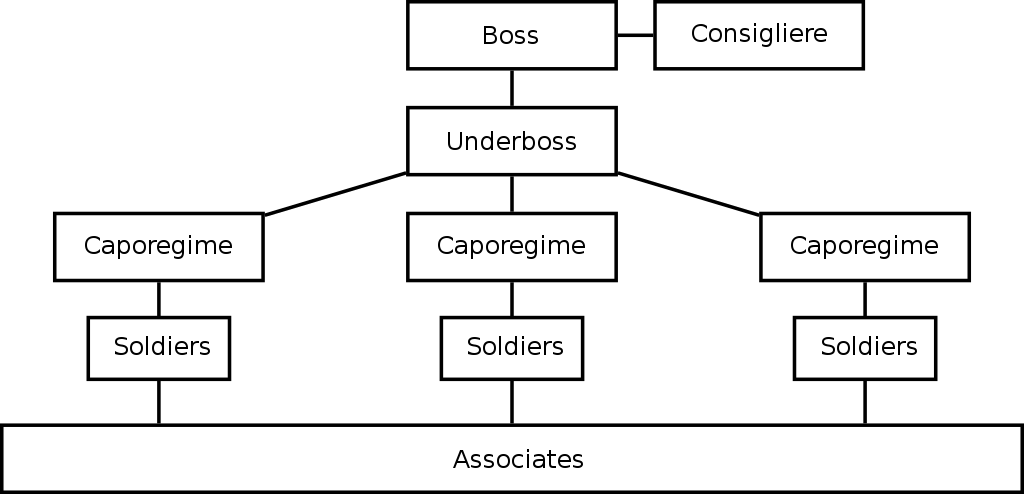The Mafia distinguishes itself from ordinary crime by its objective to exert control over both territory and the lives of the people residing within its domain. The primary focus of organized crime lies in securing long-term advantages and establishing dominance. To achieve these goals, the Mafia recognizes the utmost significance of maintaining a structured hierarchy with clearly defined ranks and roles.
This organizational structure of Mafia Ranks is essential for upholding order and minimizing internal conflicts within the organization. By adhering to this system, the Mafia can effectively wield power and exercise control over their operations and influence.

Godfather
The term “Godfather,” also referred to as “The Boss of all Bosses” or “The King,” is a designation commonly used by the media, general public, and law enforcement to denote an exceptionally influential crime boss within the Sicilian or American Mafia. This title signifies a figure of immense power and control over the entire criminal empire. However, it is rarely formally bestowed upon specific bosses as it can generate tensions among different factions or families within the Mafia.
Typically, the title of “Godfather” is informally attributed to the boss of the most dominant and influential Mafia family. This individual wields significant authority and commands immense respect within the criminal underworld. While not an official rank within the Mafia hierarchy, the term carries weight and symbolizes the utmost level of power and influence that a crime boss can attain.
Boss
The Boss, also known as the Don or capo famiglia, holds the ultimate authority within the organization. Like a company’s CEO, the Boss makes crucial decisions and wields absolute power over all members. While each mob boss may have their own unique management style, they share a common trait: commanding respect and instilling fear among their subordinates.
As the head of the organization, the Boss receives tribute from all members, making them incredibly wealthy. Many Italian-American Mafia bosses have amassed fortunes in the billions, such as Carlo Gambino, Sam Giancana, and Lucky Luciano. The Bosses enjoy near-invulnerability and are considered untouchable.
These powerful figures are renowned for their influence, success, ruthless nature, and widespread fear they inspire. Often, the title “Don” is used as a prefix to their first or last name, signifying their elevated status and authority.
Underboss
The underboss, also known as the capo bastone, holds the second-highest position within the Mafia crime family hierarchy. While the extent of his authority varies among families, the underboss is prepared to assume the boss’s role whenever necessary. In the perilous and cutthroat world of the Italian-American Mafia, the underboss may find himself leading the family if circumstances arise, such as the boss’s declining health or a lengthy prison sentence.
Typically, underbosses are groomed for eventual succession, ensuring a smooth transition of power. The potential for dual underbosses exists within a family, as seen with boss Carlo Gambino, who appointed both Paul “Big Paul” Castellano and Aniello “Mr. Neil” Dellacroce to the position simultaneously. However, having a single underboss is more common in practice. In the violent, ruthless, and volatile realm of the Mafia, the underboss plays a critical role in maintaining stability and advancing the family’s interests.
Consigliere
The consigliere, also known as the chief advisor, holds a pivotal position as the right-hand man to the Boss in the Mafia. Although not officially part of the hierarchy, the consigliere plays one of the most significant roles within a crime family. He serves as the trusted confidant and close friend of the family’s boss. The role of the consigliere harkens back to medieval times when monarchs relied on advisors for strategic information and sound guidance.
The consigliere’s primary responsibility is to provide impartial and informed counsel that aligns with the family’s best interests. Unlike the underboss, the consigliere’s decisions are not influenced by personal emotions, feuds, or vendettas. While the underboss is typically a direct relative of the boss, the consigliere is selected based on their expertise and extensive knowledge. Only the boss and underboss wield greater authority within the organized crime family.
The consigliere embodies the wisdom and sage advice necessary for navigating the treacherous world of the Mafia, offering guidance that goes beyond personal biases and fosters the family’s success.
Caporegime
The capo, also known as the caporegime, holds the position of captain or lieutenant within the Mafia structure. As the head of a division, the capo commands a sizable crew ranging from 20 to 1,500 soldiers, who are bound to carry out various criminal activities such as murder, assault, bombings, arsons, assassinations, drive-by shootings, cash handling, deliveries, and other organized crime operations. The capo’s authority stems from his direct report to a boss or underboss, who issues instructions for the crew to execute.
Within the Mafia hierarchy, the capo holds a prominent position, ranking higher in authority. In addition to overseeing the crew’s criminal operations, the capo assumes responsibility for managing finances, making him a key figure in handling the illicit proceeds of their activities. The capo’s role involves maintaining discipline within the crew and ensuring their loyalty to the higher ranks.
The capo’s influence and power extend beyond mere enforcement, as they play a vital role in the Mafia’s organizational structure, carrying out the directives of the boss or underboss while managing the crew’s activities and financial operations.
Soldiers
The soldiers do the grunt work and serve as operatives at the lowest levels of the organization. These are responsible for carrying out a wide range of responsibilities, including making deliveries, collecting cash, and criminal activities such as bombings, arson, assassinations, drive-by shootings, witness intimidation, juror tampering, etc on behalf of the Mafia.
Soldiers are the backbone of the Mafia organization and execute the day-to-day operations. They willingly put themselves at risk to demonstrate their loyalty and dedication to the Mafia. By protecting the organization’s interests and proving their unwavering commitment, they strive to establish a reputation and earn respect to climb through the Mafia ranks.
It is not uncommon for individuals to be recruited into this role at a very young age. Soldiers are expected to unquestioningly follow orders, ensuring the secrecy and integrity of the Mafia’s activities. Their reliable and unwavering commitment is crucial to the ongoing success of the criminal enterprise.
Associate
Associates are individuals who work closely with the Mafia, although they are not official members of the organization. They may collaborate with the Mafia on criminal enterprises or provide services to the Mafia in various capacities. This can include individuals who conduct business transactions with the Mafia or act as hitmen, carrying out crimes such as murder, assault, arson, assassinations, drive-by shootings, contract killings, witness and jury intimidation, car bombings, building bombings, and other organized crime activities.
Among the associates, there are also Italian newcomers known as “cugines,” who have yet to be fully initiated into the Mafia. These individuals typically have a minor role in the Mafia’s operations. Associates are expected to comply with any orders given by the Mafia and are essentially on call 24 hours a day to serve the organization.
It’s important to note that associates do not enjoy the same level of protection as full members of the Mafia unless they hold significant value or importance to the organization. While anyone can become an associate, it is typically only individuals of Italian or Sicilian descent who can ascend to become full members of the Mafia through the process of being “made.”
Also Read: Italian Mafia Today: Does The Mafia Still Exist In Italy?
